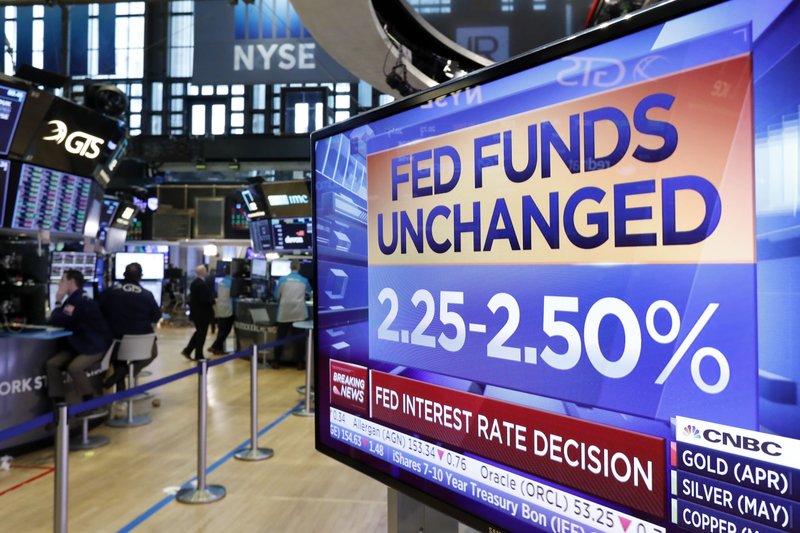Banks led U.S. stocks mostly lower Wednesday after a brief rally sparked by the Federal Reserve's latest policy update faded. The real action centered in the bond market, where prices rose sharply, pulling Treasury yields down to the lowest levels they've seen in more than a year.
The S&P 500 dropped 8.34 points, or 0.3 percent, to 2,824.23. The Dow Jones industrial average fell 141.71 points, or 0.5 percent, to 25,745.67. The average had been down more than 216 points earlier.
The Nasdaq composite eked out a slight gain, adding 5.02 points, or 0.1 percent, to 7,728.97. The Russell 2000 index of smaller-company stocks gave up 11.83 points, or 0.8 percent, to 1,543.16.
Major European indexes finished lower.
The central bank said it has ruled out interest-rate increases this year and issued a dimmer outlook on the U.S. economy.
That triggered one of the biggest slides for Treasury yields in months, knocking the 10-year Treasury yield as low as 2.53 percent, down from 2.61 percent late Tuesday and from 3.2 percent late last year. The two-year Treasury yield, which is more influenced by Fed movements, fell to 2.39 percent from 2.45 percent late Tuesday.
Yields have been falling steadily since November, as worries rose about a slowing global economy and as traders subsequently made moves in anticipation of a more patient Fed.
The Fed's decision not to raise rates in 2019 is a marked change from three months ago, when the central bank projected two rate increases in 2019. The move comes as Fed officials project that the U.S. economy will grow more slowly this year and in 2020, a change from the panel's projections just three months ago.
The central bank also said it will stop shrinking its bond portfolio in September, a step that would help hold down long-term interest rates.
The Fed's announcement was clearly positive for the market, said Quincy Krosby, chief market strategist at Prudential Financial.
"Powell's suggestion that the Fed is on hold this year is important," she said. "The question for the market remains whether or not the four rate hikes from last year and the unwinding of the balance sheet at the same time could be continuing, even now, to tighten financial conditions."
It was only last autumn that interest rates were on the rise and rattling investors, who worried that an overly aggressive Fed would keep raising rates and choke off growth in the face of a slowing global economy. The Fed increased rates four times last year and three times in 2017.
Besides encouraging more borrowing and economic growth, lower interest rates can make stocks look more attractive to investors, at least compared with the lower amount of interest that bonds are paying.
On the losing end, though, are U.S. banks, whose profits can take a hit if the gap between short- and long-term interest rates narrows. Financial stocks in the S&P 500 fell 2.1 percent for the largest loss among the 11 sectors that make up the index.
KeyCorp slumped 5.3 percent, while Bank of America lost 3.4 percent.
Health care, industrial and technology stocks also took heavy losses. Humana dropped 4 percent, United Rentals fell 3.8 percent and Oracle shed 2.6 percent.
Communications and energy sector stocks notched solid gains. Netflix climbed 4.6 percent, while Noble Energy added 3.6 percent.
Information for this article was contributed by Stan Choe of The Associated Press.
Business on 03/21/2019
